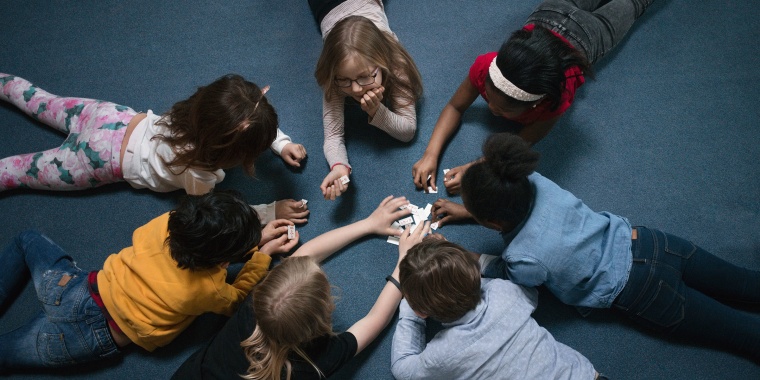Children develop strong social connections through their relationships with peers. Although the number of friendships a child has—and the nature of those interactions—may vary, peer relationships form the basis of how a child relates to the world. Studies have found that by late elementary school, more than 30 percent of children’s social interactions involve peers. Through these interactions, children explore their interest in others and learn more about social behavior, including how to express themselves, how to take turns, and how to be empathetic.
The late elementary years are a time of great social development for your child, as she is beginning to select her friends based on common personality traits or shared interests. Friendships take on new meaning during this phase, as they become more permanent, and are based on mutual trust and loyalty. Through these relationships, your child is learning about group dynamics, like when and how to cooperate or lead and when to work toward collective goals. This is also a time when children begin to care about being popular. It’s good to talk to your child about this and encourage her to just try to make good friends. Explain to her that true friends like and accept her for who she is, and that she should focus on nurturing those relationships, regardless of how popular those friends may be.
Be actively involved in your child’s life and continue talking to her about her friends and relationships. Research has shown that children recognize the value of group loyalty and experience peer pressure as early as age nine. Sean Slade, director of the Whole Child Initiative at the Association for Supervision and Curriculum Development, says that at this age your child’s desire to be a part of a group is growing and the influence of peers is strong. Peer pressure can be both a positive and a negative influence. It can be a good thing, for example, if your child’s friends encourage her to resist bad behavior or get good grades, but it can also influence her to act in ways that she may not be comfortable with. Director of the Rutgers Social and Emotional Laboratory Maurice Elias adds that your child may need your guidance when she is faced with conflicts between loyalty to the group and fairness to outsiders. Partly, it’s because your child is still learning her own values and ideas. At this age, she is most concerned about not disappointing her friends when she is with them.
This can cause her to make some decisions that might strike you as being unlike her. While your child may appear to want more alone time or time with her friends, she may still want to be able to talk with you and use you as a support. Be open and aware of this and be prepared to have chats with your child when she needs them. When you see signs of social pressure like a change in attitude or sudden materialism (like wanting a phone or an expensive name-brand item), you can feel free to ask, “Where is that coming from?” You may also find that your child tends to be disrespectful or talks back to you after she spends time with certain friends who may think this kind of behavior is “cool.” If this is the case, speak to her about the value of resisting peer pressure and start limiting time spent with those individuals; encourage friendships with other children instead.
Remember to talk with your child about bullying, including cyberbullying. While your child may not be on Facebook, Twitter or Instagram yet, it is important to begin planting the seeds for her future online behavior. Explain to her that it is never acceptable to criticize or make fun of others, and that being a bystander can sometimes be just as hurtful as being the instigator. Opening up a dialogue about bullying can help your child to better understand the consequences of what happens when she criticizes or excludes others or allows it to happen without standing up for the victim. And, of course, you must be sure your child knows that what is on the internet is permanent: someone can always find it, even if you think you erased it.
Parent Toolkit resources were developed by NBC News Learn with the help of subject-matter experts, including Maurice Elias, Director, Rutgers Social-Emotional and Character Development Lab; Jennifer Miller, Author, Confident Parents, Confident Kids; and Michele Borba, Author and Educational Psychologist.
